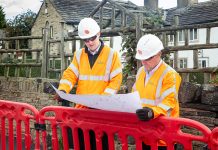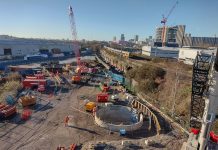Help is at hand from Pipeline Services
Key budgetary decisions can only be taken by water companies when they know the current state of their pipeline infrastructure. While accurate data on pipe condition has always been needed across the industry, obtaining the data has usually involved an interruption to water services and significant time and cost in conducting intrusive manual inspections. Also, assessments of pipe condition have up to now been conducted in isolation, with little sharing of cumulative experience and evidence which could help in making more accurate predictions of pipeline life spans.
To answer both of these issues, Pipeline Services has developed an array of non-intrusive, cost-effective measurement and assessment techniques and has just launched a tool which taps into a huge database of past data. These services provide water companies with the knowledge required to make the best possible decisions on whether to renew sections of mains or to just rehabilitate them, knowing then with some accuracy their remaining lifespan. Clearly it is more economical to rehabilitate pipelines which have decades left of useful life, though conversely to rehabilitate when ongoing repairs are going to be required is a false economy. For non-intrusive assessment the answer lies in using the latest ultrasonic, acoustic and CCTV techniques to obtain accurate data with no interruption to service: see a complete picture of the state of your mains by sitting in your office watching a DVD, or studying data on your PC! To cover all assessment requirements, Pipeline Services offers a full suite of pipeline inspection services:
Structural Assessments
- Non-Destructive Inspection (NDT): Using ultrasonics, a section of pipeline equivalent to a destructive pipe sample can be scanned to provide accurate internal and external corrosion measurements. From this data the remaining life expectancy can be assessed accurately.
- Acoustic Condition Assessment Inspection (ACA): With no excavation necessary, existing apparatus is used to generate acoustic signals throughout a section of a pipeline, helping to calculate the remaining pipe wall thickness along the section. A leakage assessment can also be performed using the same equipment – even at the same time!
Internal Inspections
- Under Pressure CCTV: Pipeline Services can insert a CCTV camera via under-pressure drilling or virtually any type of apparatus. This can pin-point internal problems such as lining condition, bore-loss, bio-film development or lost and defective valves, other fittings and connections etc. CCTV is generally used in conjunction with NDT to provide a survey of the internal condition highlighting water quality, hydraulic grading and sediment build-up. We can even remove samples of sediment, bio-film and water in supply through the camera insertion point.
- Under Pressure Rodding and Crawler CCTV: Pipeline Services rodding cameras and crawler units can inspect aftermarket spray linings that are suspected of deterioration. They can pinpoint cross connections, service connections, hidden or buried apparatus and leakages.
- Under Pressure CCTV via Hydrant: This requires no excavation and can provide information on bore-loss due to corrosion ‘tubercollation’ and lining condition. Excellent for use in a pre-design feasibility study to determine if a lining is present.
Additional Services
- Under Pressure Drilling – Sample Coupon removal: To see sediment and tuberculation build-up, coupons are removed using an under-pressure drilling technique. This will also show how well lining or tuberculation is adhered.
- Soil and Water Analysis: This can be used to assess the structural condition and in fracture risk analyses. We can remove water samples from any position within the pipeline for laboratory analysis.
- ‘Legion’ Predictive Pipe Condition Assessment Tool: Utilising an extensive database of over 30,000 pipe sample analyses taken from across the UK and Ireland, this provides an accurate prediction for any given section of metal pipeline. Combined with client’s own leakage and mains pressure records and CCTV techniques requiring no excavation, Legion provides an excellent, no-dig procedure for assessing condition and predicting life expectancy.
So, by tapping into our wealth of past data and using the latest non-intrusive technology, Pipeline Services really can remove the guesswork involved in making that renew or rehabilitate decision.
Jason Smith, Pipeline Conditions Manager, Pipeline Services
www.upls.co.uk
jasonsmith@pipeline-services.co.uk





